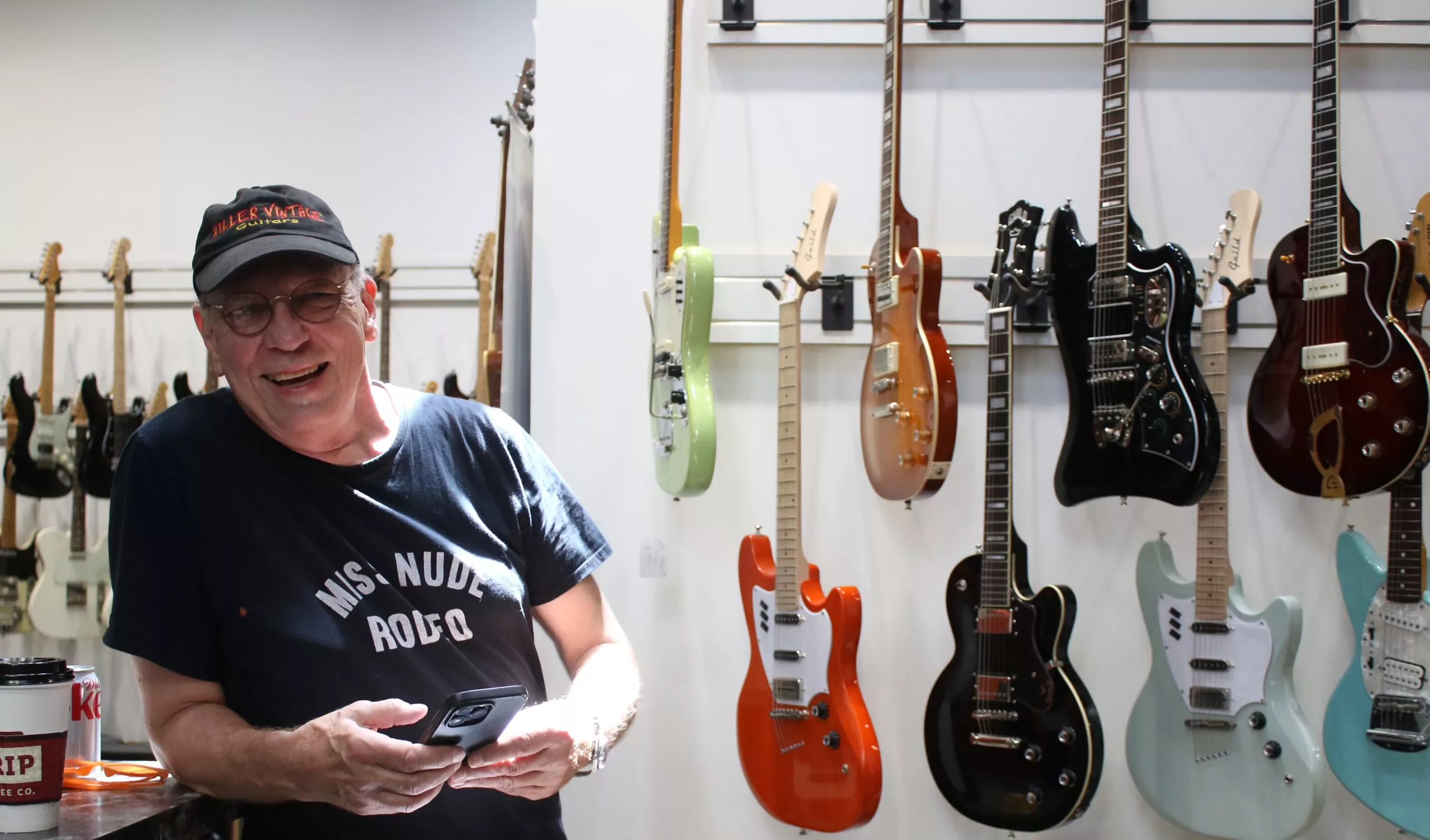
Alex Powell

Audio By Carbonatix
Since opening in 2016, Killer Vintage Specialty Guitars has attracted musicians from across the nation to its unlikely outpost, sandwiched between Dallas Love Field Airport and the Dallas North Tollway at 3738 Haggar Way.
The shop’s owner, Dave Hinson, has always been a guitar guy. He started lessons at age 11 and began trading guitars soon thereafter.
“We didn’t have a lot of money,” Hinson says of his youth. “So I was constantly trading, buying, whatever to get a better guitar.”
He started dealing guitars professionally in the 1970s, a time when the concept of a vintage guitar didn’t exist. Since then, he’s been one of the editors for the Vintage Guitar Price Guide and a contributing editor for the Blue Book of Guitar Values.
For Hinson, this business is about the hunt.
“To me, finding the guitar, acquiring it, is the challenge, but it’s also the best part of it, as opposed to unfortunately having to sell them to make money,” he says. “It’s what we all live for.”
Sometimes people walk into the shop with no knowledge of the instrument they are holding in their hands, presenting their uncle’s dust-ridden guitar with humble obliviousness.
“That’s the fun,” Hinson says. “Finding those hidden gems and telling people what they have. Sometimes they don’t know.”
“To me, finding the guitar, acquiring it, is the challenge, but it’s also the best part of it.” – Dave Hinson
Killer Vintage Specialty Guitars began in St. Louis in 1994, and the store opened a location in Dallas in 2016. The shop quickly made a name for itself – a fact that becomes clear as one enters the Dallas store with its signature-covered walls. (For curious readers, the shop’s clientele includes the likes of Counting Crows, Billy Gibbons and Tom Petty.)
Hinson resides in Dallas now, a place he says has “a pretty strong respect and support for new musicians and new artists.”
“That’s one of the reasons I consider [Dallas] home,” he says. “St. Louis has completely become tribute bands. There is no room for new music at all. It’s fine. They are doing what they do.”
The shop specializes in high-end and vintage guitars and also in repairs. But if you don’t know it for the guitars, you may know it from the T-shirts, which have taken on a life of their own.
“The most famous one is Lee Harvey Oswald with an Elvis mic,” he says. “David Crosby said to me that my T-shirts are legendary.”
Beyond selling, trading and offering repairs, the store has become a vital outpost for the Dallas music community.
“It’s a combination of having a place where professional musicians can, you know, sort of be with their peers and help younger musicians,” he says.
Nick Snyder, a Dallas guitarist you may know from The Roomsounds or Holy Roller Baby, met Hinson early in his career at a local jam.
“Since I met him, I started working [at Killer Vintage Specialty Guitars] basically since they opened, off and on,” says Snyder. “It’s the only real vintage shop in Dallas proper.”
For Snyder, Killer Vintage Specialty Guitars is a lot of things, but it’s definitely not a showroom.
“It’s got a bunch of guitars that a bunch of people have probably never seen, you know, in their lives,” Snyder says. “It’s small and welcoming. One of Dave’s favorite things to say to people is, ‘This ain’t no museum,’ whenever they come in there. They always ask if they can touch the guitars or play the guitars. His answer’s always ‘yes.’ These are guitars. They are meant to be played.”
Hinson’s reach goes much farther than the walls of his storefront. Going to jams and watching live gigs, he is an active engine for the Dallas music community. He has also started working with Boarded Up Music, a nonprofit that started during the pandemic to make professional-grade videos for original bands in the area.
Originally, the organization started to help bands get exposure and provide them with something to use to further their career during the industry-killing pandemic.
“A lot of my business is dealing with successful artists,” Hinson says. “I really like the idea of helping the unknowns become successful artists.”
Though live performance has returned, the nonprofit has continued its work.
“I can’t imagine where we’d be without [Hinson],” says Ron Wilson, owner of Louie Louie’s Piano Bar and founder of Boarded Up Music. “I can’t even speak highly enough about [Killer Vintage Specialty Guitars]. Dave’s donated not only equipment for the bands to use, but also last night he donated a guitar. We were able to raise $1,900 by raffling this guitar.”
Wilson continues, “He’s kind of a quiet guy, which to me is kind of an oxymoron. But he’s a quiet guy that’s really good at networking with the music community. He knows everybody. He’s been a great resource for us, taught us a bunch of things.”
Despite the shop’s clout on the Dallas music scene – and national scene, for that matter – it remains a place where any musician can buy, trade and learn.
Killer Vintage Specialty Guitars resides outside of Dallas’ busiest centers.
“It’s a little, out-of-the-way shop,” Snyder says. “It’s not really in a prominent area. So it kind of has to be found, which I think adds to the little mystique of it.”
Once it is found, though, Snyder knows that any visitors will be welcomed into the club of those who know.
“Any musician can come in here, whether they buy something or not,” he says. “They can try on the amp, try the pedal, try a piece of history. That’s kind of how I look at that place.”